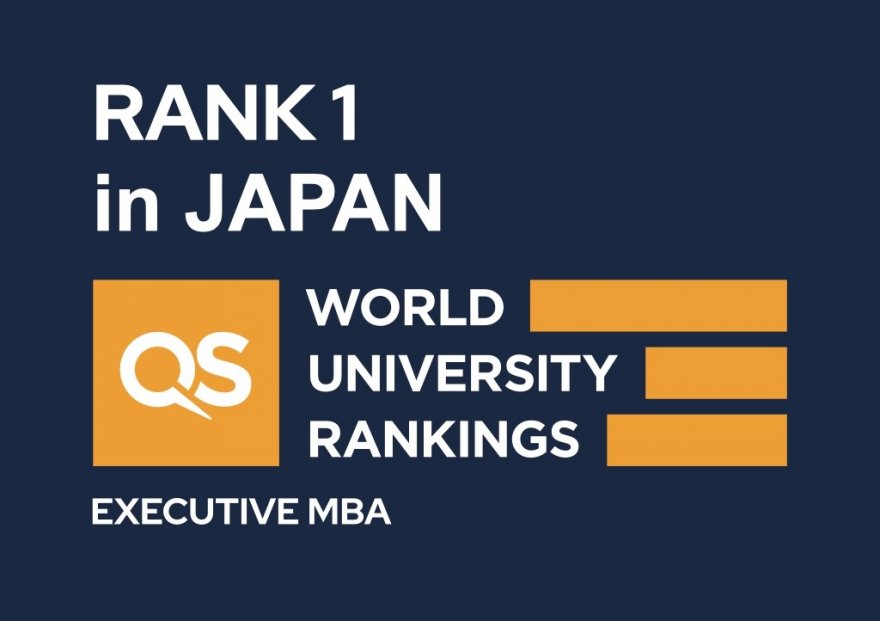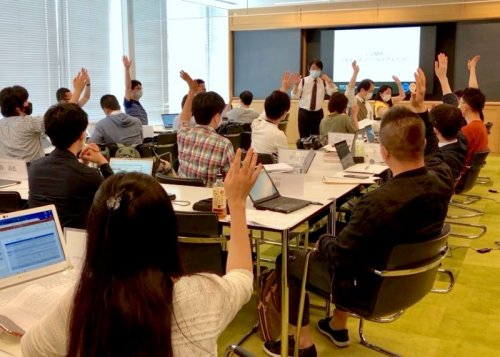Lead your company to industry-defining success
As your career progress, it becomes apparent that the skills required to be successful in business are very different from the skills required to be a successful leader. The reason is that leadership demands more than management knowledge or skills; it demands a will to evolve. In business, leaders must transform their companies or organizations in order to redefine how success can be achieved.
Our EMBA program, led by experienced practitioner faculty members, has nurtured more than 1,000 next-generation leaders through intensive lectures that make the most of their weekends. These lectures hone leadership sensitivity by simulating management decisions through case studies of as many as 200 companies in an academic year. In addition, through participant-centered class discussions in the case method, course participants learn the business ethics required of leaders in order to maintain trust, loyalty, and drive towards a unifying vision.
-
Average age
42
-
Program
2 years
-
Degree
EMBA
-
Ranking
# 1 in Japan
-
Language
JP
-
Case Method
100 %
About the Executive MBA
The University of Chicago Graduate School of Business was the first school in the world to introduce the Executive MBA (EMBA), which was launched in 1943 as an MBA program for professionals with extensive work experience. Since then, the EMBA is often used in the U.S. and Europe to distinguish programs for seasoned veterans of business from standard MBA programs. While admission to MBA programs does not necessarily require working experience at some institutions, the EMBA, by definition, must.
Following the lead of other top business schools around the world, we debuted our own EMBA program in 2003: the first of its kind in Japan. The program is designed for professionals who aim to become core members of their companies and who have at least 8 years of work experience (recommended 15 years). Since our school is a weekend graduate school for professionals, even the busiest of C-suite level executives and managers are able to participate in this program.
A path to further growth
In the EMBA program, students will acquire management/administrative skills based on a company-wide perspective. Students will improve their leadership skills by acquiring the ability to logically analyze the current situation, identify problems, provide solutions and formulate management strategies. As a result, businesspeople who have studied in our EMBA program have not only been promoted to management positions, but have also grown to play a central role in their companies by changing their careers from sales to marketing. In addition, the leaders who are currently working in management positions have become true general managers who can lead not only their companies, but also entire industries.
Executive MBA Ranking
-

FT EMBA Ranking
# 1 in Japan
-

QS EMBA Ranking
# 1 in Japan
-

QS EMBA Ranking
# 15 in Asia
Our school is the first in Japan to be ranked (1st in Japan, 18th in Asia Pacific) in the Financial Times Business School Rankings (commonly known as "FT Rankings"), the most trusted and influential business school rankings in the world. The FT ranking is characterized by the fact that 70% of the total evaluations are related to post-graduation outcomes and internationalization. In the world of business schools, the FT Ranking is considered as a "cost-benefit ranking" of MBAs as an educational investment, so to speak, where the increase in salary after graduation is questioned. With this prestigious recognition, we are committed to international education and research activities in order to further improve the quality of our programs.
Weekend EMBA
The EMBA curriculum is specially designed to help students acquire the ability to look at management as a whole, which is necessary for executives and managers. The EMBA curriculum is categorized into six areas, providing students with comprehensive business management skills, strategic thinking methods, and visionary skills and knowledge required of business leaders.
READ MORE
High quality faculty
The majority of our faculty members are practitioners who have been active on the front lines of business and have passed a number of strict international standards on practical experience related to their teaching fields and publications. We provide participant-centered learning directly related to the business by conveying the experience and knowledge gained from business through participant-centered case method teaching.
READ MORE
Expanding business networks
The importance of global management and diversity management give new value to exposure to new perspectives. The opening of channels for the exchange of information and the strong human network that results are enduring benefits of study at our school. The bonds forged through rigorous discussions and collaborative learning have developed into new businesses that transcend the boundaries between cultures, generations, and industries.
The majority of our EMBA students are in their late 30s or early 40s, and half of them have 10 to 20 years of work experience. The collection of individuals from various backgrounds strengthens discussion through examination from all angles. The classroom is an environment where frank exchanges can take place on a level field, and the viewpoints of peers with extensive experience will convey valuable lessons that cannot be learned from textbooks.
Industries represented by current students
Age distribution of current students
Interview
Report
-

EMBA × Green Techno 21《Business Analysis》
- Report
Professor Yuko Haga, who is also an independent consultant by profession for major companies, conducted the lecture on "Business Analysis," an EMBA module at Osaka Campus. At NUCB Business School, ...
READ MORE
-

EMBA × GE《Strategic Management》
- Report
Professor Osamu Ueda, who is also an independent lawyer and management consultant conducted the lecture on "Strategic Management," an EMBA module at Osaka Campus in which he provides advice on corp...
READ MORE
-

EMBA × LVMH《Corporate Mission & Strategy》
- Report
Professor. Mitsuyori Miyake conducted the lecture on "Corporate Mission & Strategy," an EMBA module at Osaka Campus. Prof. Miyake is an experienced practitioner with more than 30 years as a pri...
READ MORE
-

Corporate Governance and Business Ethics at Olympus
- Report
Introducing "Corporate Governance and Business Ethics," an EMBA course which will start on May 8 at the Osaka Campus. Professor Hirotomo Abe, who is in charge of the class, is an outside director o...
READ MORE
-

《EMBA》Crisis Management and Leading Change Professor Nana Otsuki
- Report
The Osaka Campus has been operating face-to-face classes since the fall semester of 2020, observing ventilation, social distance, and thorough countermeasures against viral infections, and will int...
READ MORE
-

《EMBA》Organizational Behavior & Leadership, Professor Haruo Takagi
- Report
In the fall semester of 2020, Nagoya Campus will be operating face-to-face classes, observing ventilation and social distance, and taking thorough measures against viral infection. Organizational B...
READ MORE
MBA Japan
About MBA
MBA stands for Master of Business Administration, and three organizations accredit MBA programs internationally (AACSB, AMBA, and EQUIS). The standard MBA program in Japan and the U.S. requires one to two years of study. The MBA is a degree in business administration, not a proprietary qualification like those for accountants and lawyers.
In the U.S., the home of the MBA, 100,000 MBAs graduate per year. In addition, it has been reported that 60% of general managers in listed companies hold an MBA degree or higher. The two major industries in which demand for MBAs is high worldwide are finance and securities and healthcare and pharmaceuticals. This is because industries that barriers to entry have traditionally protected are undergoing restructuring on a global scale.
| Accreditation | AACSB・AMBA・EQUIS |
| Degree | Executive MBA・MBA・MSc |
| Language | English・Japanese |
| Duration | 2years・1Year |
International Network
Brochure & Application Guide
Download materials that comprehensively introduce programs of study, employment, and international exchange at the NUCB Business School, as well as materials that introduce in detail the schedule and examination subjects of last year's entrance examinations, a collection of entrance examination questions, entrance examination data, and entrance qualification examination forms.


 Brochure
Brochure
 Info Session
Info Session
 Application
Application
 Alumni Voices
Alumni Voices



